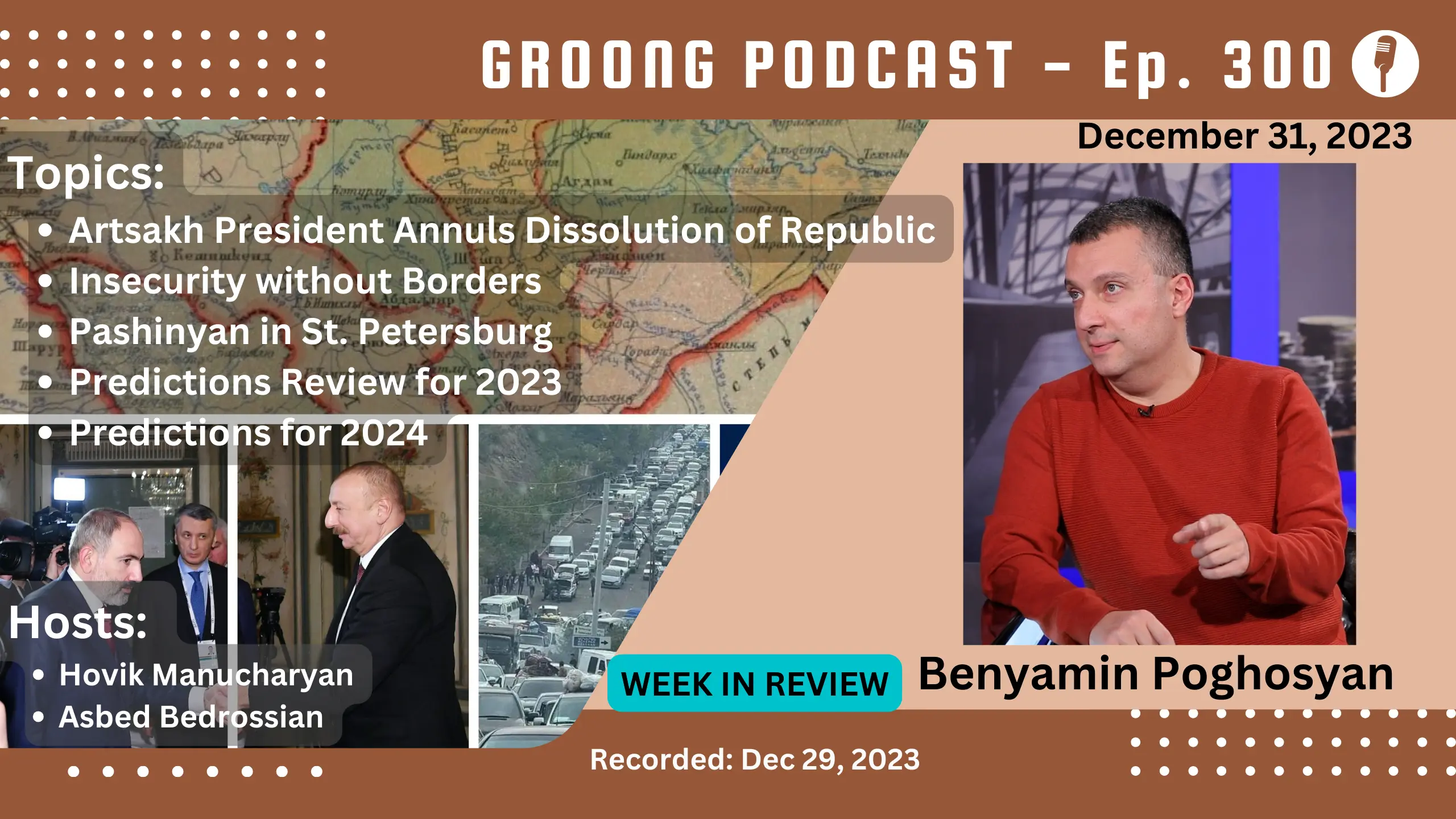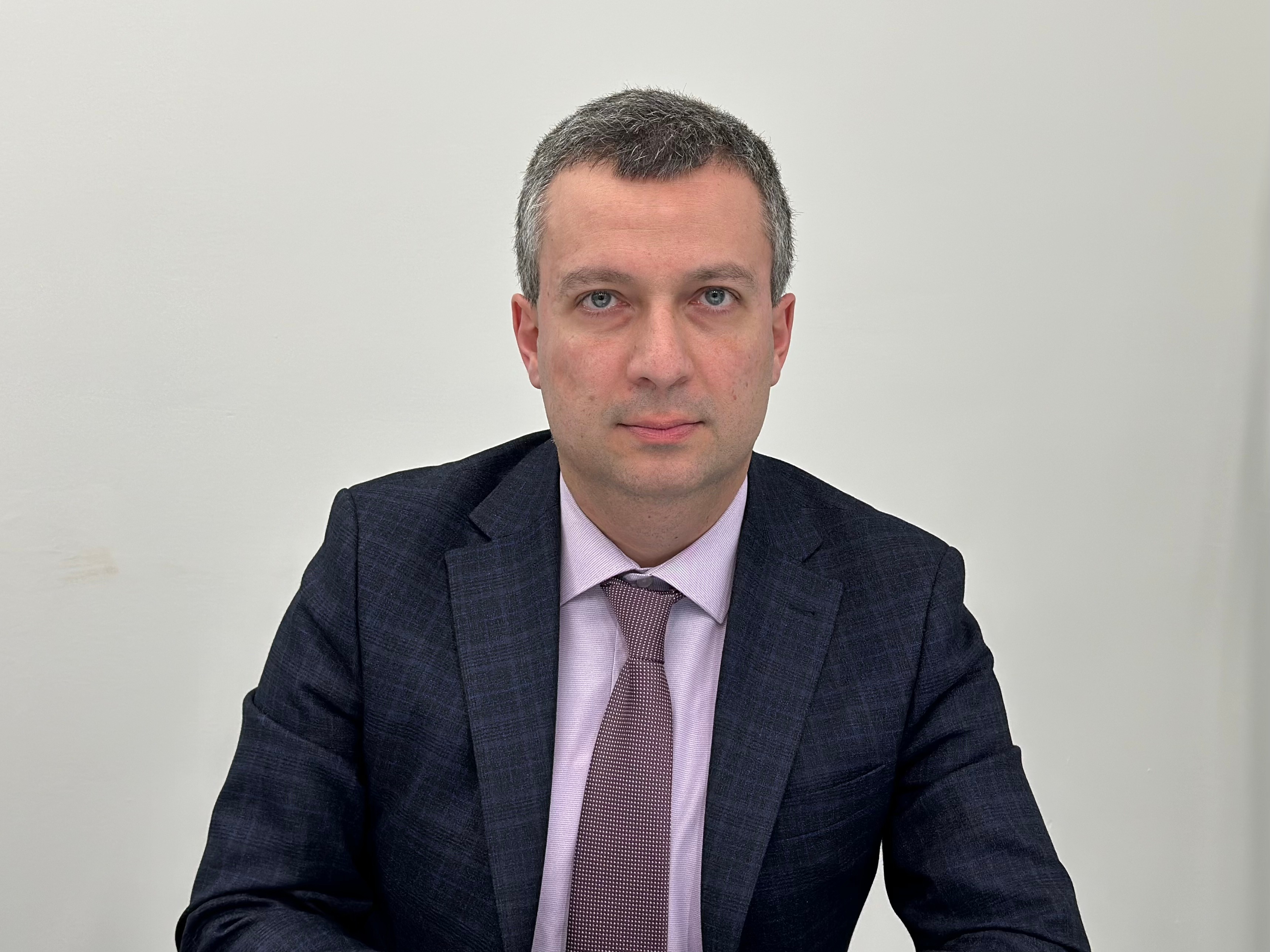
Groong Links:
Guest:
Topics:
- Artsakh President Annuls Dissolution of Republic
- Insecurity without Borders
- Pashinyan in St. Petersburg
- Year-end 2023 Predictions Review
- Predictions for 2024
Episode 300 | Recorded: December 31, 2023
Show Notes
Artsakh President Annuls Dissolution of Republic
Three months after Azerbaijan’s invasion of Artsakh Republic and eviction of its remaining 100,000 population, president-in-exile Samvel Shahramanyan has allegedly annulled his declaration of dissolving the republic on January 1, 2024, which he had made under duress, to save more civilians from brutal torture and murder.
There are a number of serious caveats to this story:
- First, the original document claiming to be that of dissolution of Artsakh has never been officially published, Shahramanyan made the declaration in the middle of a brutal invasion and with hundreds of Armenians being killed.
- Even if this document was indeed what it is purported to be, legal analysts claim that it is invalid, since besides being made under duress, the executive branch cannot legally make a decision to dissolve all other branches of government and terminate a country like it’s a defunct business.
- The news about the annulment comes from his adviser, Vladimir Grigoryan and not Shahramanyan himself. The following day, Grigoryan issued a statement indicating that what he said previously was his own personal opinion, and by the way, he is no longer Shahramanyan’s adviser. Many speculate that this was a result of the strong backlash from Civil Contract reps, which we’ll talk about below.
Questions:
- Where does this leave the legal status of Artsakh?
- What is the significance of the debate around the dissolution and the authenticity of these unpublished documents?
Pashinyan and his government have washed their hands of Artsakh ever since their defeat in the 44-day war. The man who once said “Artsakh is Armenia Եւ Վերջ” now wants you to believe that the case of Artsakh was doomed from the start.
However, news of Shahramanyan’s annulment puts a spoke in Civil Contract’s dreams of closing the “Artsakh Chapter” out of their agenda, so last weekend they lashed out and slammed Shahramanyan, calling him a “displaced person” no different than his 150,000 compatriots, and that he and his Artsakh government pose a threat to Armenia, and that none of their actions on Armenian territory can have legal force.
Question:
- Why is the Civil Contract so freaked out about Shahramanyan’s statement, and why are they dead set against the survival and functionality of components of the state of Artsakh?
Pashinyan cronies have all used the same terminology, that the remnants of the state of Artsakh pose a grave danger to Armenia’s national security.
Questions:
- Does this comes straight from Aliyev, that if Pashinyan doesn’t dismantle the state of Artsakh in Armenia, then Azerbaijan will attack?
- What options does Armenia’s government have?
- The Armenian opposition supports Shahramanyan, what can they do, how can they help?
Insecurity without Borders
Last week Azerbaijan responded to Armenia’s negotiating positions. First they stated that they would negotiate in Washington if Biden waives Section 907, which prevents US military support for Azerbaijan. Aliyev’s advisor Hikmet Hajiyev has also made it very clear that a signed treaty is no guarantee for peace. He also proposed that border discussions should not gate a “peace treaty”.
Azerbaijan has come under pressure to come back to negotiations, so this proposal is a clear effort to deflect that pressure by pretending that they’re willing to negotiate, while removing Armenia’s legitimate concerns off the agenda. And of course, Pashinyan’s government signaled yes, they’re open to it!
Analysts say that throughout the evolution of the negotiations post 2020, the Armenian side was vying for three key points to be included in any signed document:
- Status of Artsakh (which later got downgraded to “rights and security of Armenian residents of Karabakh”).
- Clear delimitation based on Soviet maps (which started from the 1926 maps, which did not have any enclaves to the 1975 maps featuring Azerbaijani enclaves whose legitimacy is contested)
- Opening of transportation routes, which Pashinyan claimed would be a challenge to Armenia’s sovereignty and thus wanted to remove Russia as a security guarantor of the road.
Aliyev cynically says that he solved the problem of Artsakh. World powers seem to be willing to accept this and are working hard to push the sides to sign. Pashinyan himself seems to have accepted this since he’s continuing negotiations.
Now, it appears that Azerbaijan wants to take out any specificity about borders.
Many analysts are not certain how Armenia is going to go against Russia by undoing its signature on the Nov 10 statement, expecting that Russia will in the end control the roads connecting Azerbaijan with Nakhijevan.
So it seems that the three points which Armenia was hoping for will either be considered as obsolete or will be postponed, leading to a signature of a vague document.
Question:
- What’s your assessment of this last round of so-called “negotiations”?
Prior to this round, even Pashinyan cronies had stated that border delimitation was a crucial goal towards security. Now they’re confusing the Armenian people by talking from both sides of their mouth. Alen Simonyan is saying it’s OK to not talk about the border, while Ararat Mirzoyan is saying that the border discussions are important for the treaty.
Question:
- What is it that they’re saying, or signaling to Azerbaijan? How is it ok to negotiate for peace without borders, or recognition of Armenia’s sovereignty?
Russian Peacekeepers
Meanwhile, Russia is still “peacekeeping” in Artsakh.
Questions:
- What are Russia’s objectives in Artsakh, without any Armenians to watch over?
- The EU, the US, France, and Russia have all stated that September did not close the chapter on Artsakh. Is there a convergence of vision for a future status of Artsakh: with or without independence, autonomy, or even Armenians?
Pashinyan in St. Petersburg
Pashinyan’s was in St. Petersburg last week, where he attended a summit of the Eurasian Economic Union (EAEU) leaders. One major achievement was a sweeping free-trade agreement between the EAEU and Iran (a preliminary agreement was already in effect since 2019). Also, Armenia will assume the presidency of the EAEU in 2024.
In the past six months or more, Armenia has pretty much boycotted Russian-led post-soviet alliances: the CSTO, the CIS, the EAEU. And while Pashinyan’s government has been slamming Russian-led alliances, Armenia’s economic dependence on Russia is deep. A third of Armenia’s economy, and half of all exports, depend on Russia. So when Russia raised technical difficulties at the Lars border checkpoint, Pashinyan knew that this was an invitation he could not refuse, to go to St. Petersburg.
Questions:
- Does it make any sense for Armenia’s leadership to diverge the country’s security alignment away from its economic wellbeing and dependence, especially considering the currently antagonistic relationship between the West and Russia?
- To this end, there is some realization in the government that they can’t kick Russia out without a more diversified economy, but that would take years, if not decades.
Review & Outlook
2023
As this is the last show of 2023, let’s review like we did a year ago for our January 1, 2023 show; that was Episode 197.
In that show we looked back over 2022, and we each made one high, one medium, and one low probability prediction for 2023.
Asbed
- High: Political resolution to war in Ukraine: ❎
- Medium: Kremlin power struggle that would cost defense minister and other military types their jobs. ❎
- Note: there was a putsch attempt in June of 2023 by the Wagner Group, but it was unsuccessful. ✅
- Low: In the case of a Kremlin power shuffle, Putin might lose power. ❎
- Note: Putin dealt with the Wagner putsch within 36 hours, and the group was disbanded, while Prigozhin and his leadership team went to Belarus. Two months later they were killed in a plane “accident”.
Benyamin
- High: There will be escalations of violence and threats by Azerbaijan. ✅
- Medium: The war in Ukraine will continue. No change in Artsakh Status. ✅❎
- Low: Armenia will not capitulate. There won’t be a putsch against Putin. There won’t be a Ukraine-Russia peace treaty. ✅❎✅
Hovik
- High: There will be escalations of violence and threats by Azerbaijan. ✅
- Medium: Pashinyan’s motorcade will grow in 2023. ✅
- Low: Pashinyan will be tried for treason. ❎
2024
Make three predictions for 2024, one that you think is high probability of happening, a medium, and low probability.
Asbed
- High: The Armenian real estate market may experience a significant downturn.
- Medium: Trump may get elected US president again.
- Low: The Israel-Gaza war may expand to engulf other regional powers.
Benyamin
- High: Some sort of Armenia-Azerbaijan agreement will be signed, but threats on Armenia will continue.
- Medium: Conflict in Ukraine will be frozen. Maybe a ceasefire level agreement.
- Low: Some Armenians may return to Artsakh.
Hovik
- High: Some meaningless Armenia-Azerbaijan “treaty” will be signed. Enclaves may be captured by Azerbaijan.
- Medium: Pashinyan will take more dictatorial steps to cling to power. The West will turn a blind eye.
- Low: The Armenian opposition will figure out how to struggle more effectively.
Wrap-up
HAPPY NEW YEAR EVERYONE, we hope that 2024 is a better year for Armenians around the world than 2023 was, and we look forward to continuing our podcasts and our stimulating interactions with you, our listeners around the world.
That’s our Week in Review, we hope you found it helpful. We invite your feedback and your suggestions, you can find us on most social media and podcast platforms. Thanks to Laura Osborn for the music on our podcasts.
Guests

Benyamin Poghosyan
Dr. Benyamin Poghosyan is a Senior Research Fellow at APRI Armenia, a Yerevan based think tank,and the Chairman of the Center for Political and Economic Strategic Studies. He has served as the vice president for research and head of the Institute for National Strategic Studies at the National Defense Research University in Armenia. Dr. Poghosyan was a Distinguished Research Fellow at the US National Defense University College of International Security Affairs. He is a graduate from the US State Department Study of the US Institutes for Scholars 2012 Program on US National Security Policy Making. He holds a PhD in history and is a graduate from the 2006 Tavitian Program on International Relations at Fletcher School of Law and Diplomacy.
Hosts

Asbed Bedrossian
Asbed Bedrossian is an IT professional, and for years oversaw the central IT enterprise infrastructure and services at USC. His decades of experience spanned across IT strategy, enterprise architecture, infrastructure, cybersecurity, enterprise applications, data center operations, high performance computing, ITSM, ITPM, and more.
Asbed founded the Armenian News Network Groong circa 1989/1990, and co-founded the ANN/Groong podcast in 2020.

Hovik Manucharyan
Hovik Manucharyan is an information security engineer who moved from Seattle to Armenia in 2022. He co-founded the ANN/Groong podcast in 2020 and has been a contributor to Groong News since the late 1990s.
Disclaimer: The views expressed by Hovik Manucharyan on the ANN/Groong podcast are his own and do not necessarily reflect the opinions of his employer or any other organization.